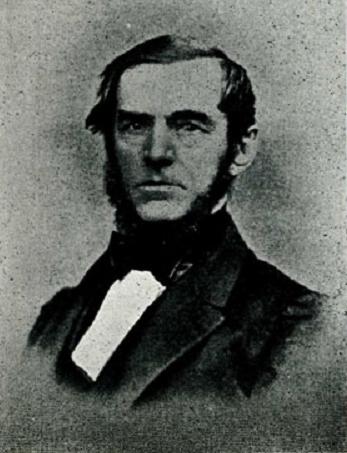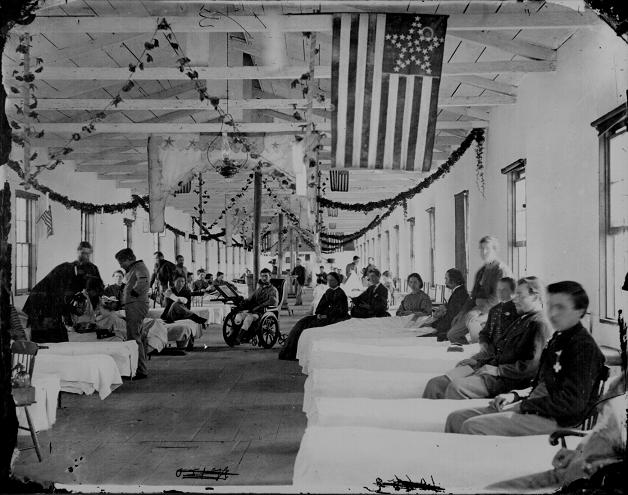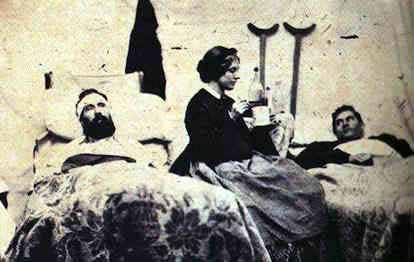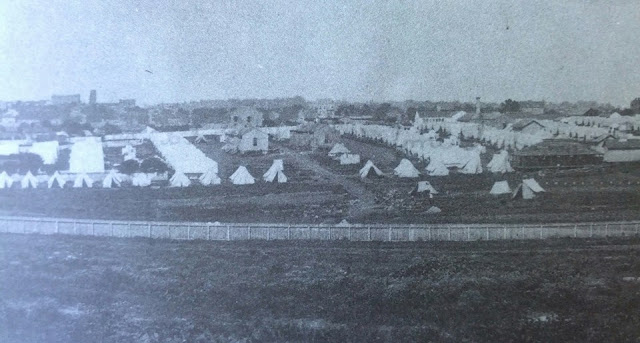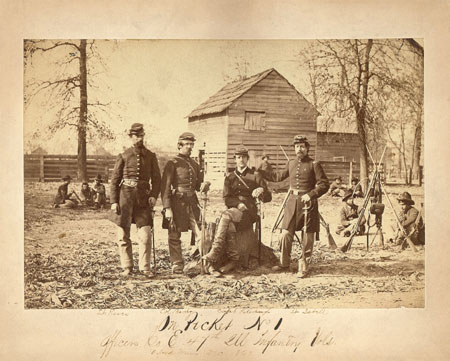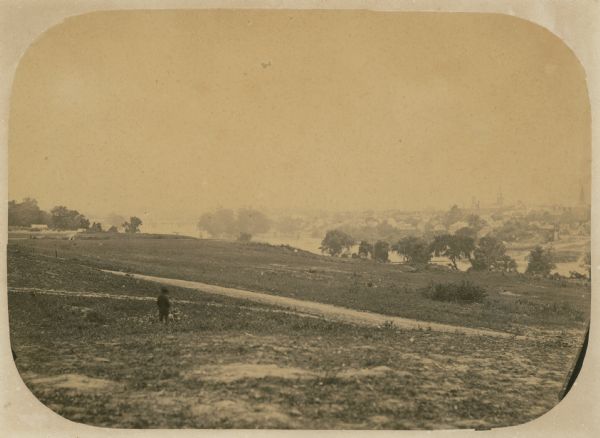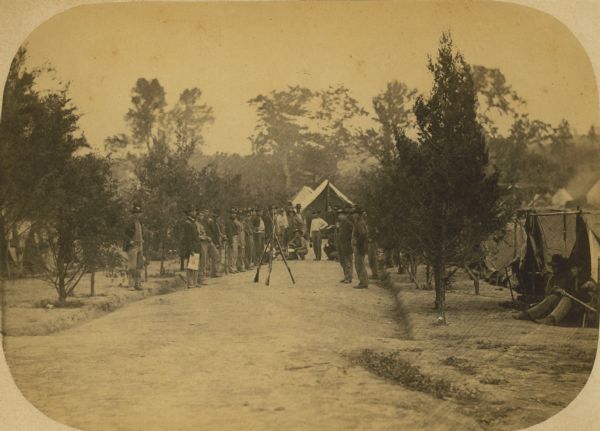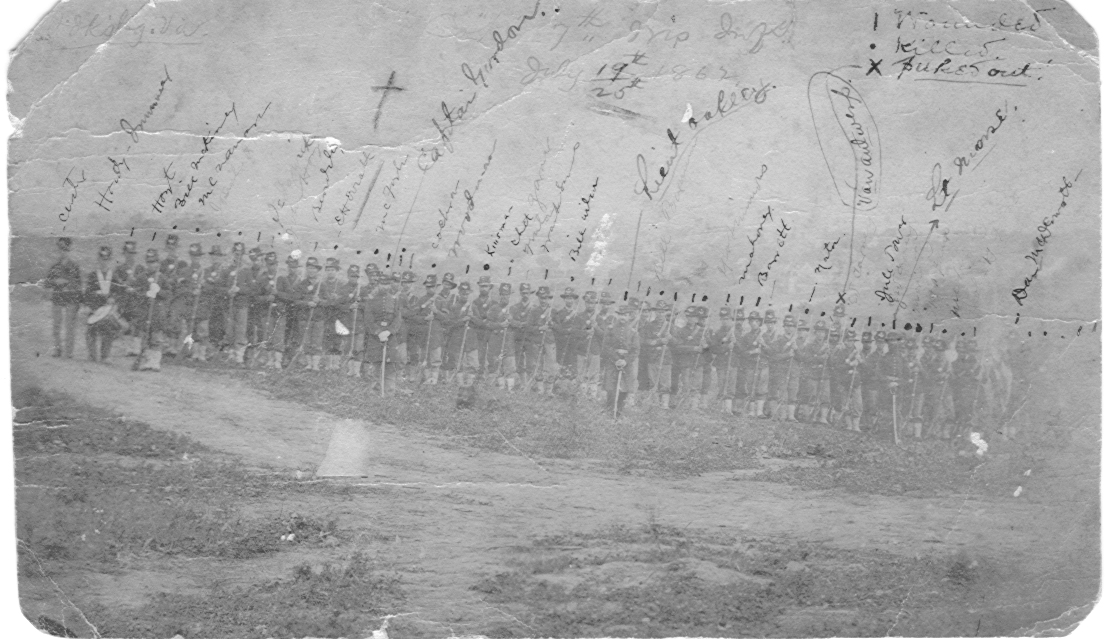JAMES CALDWELL: Enrolled on Aug. 14, 1861, as Captain, Company D, 2nd Regiment, Ohio Cavalry; commissioned as such on Sept. 4, 1862; resigned commission on May 15, 1862; re-commissioned on Sept. 20, 1862, as Captain, same company and regiment; discharged on Feb. 15, 1863. James’s sons Howard James Caldwell and Oscar A. Caldwell served with him in Company D as Privates. Howard enlisted on Aug. 17, 1861; and was discharged for disability on Feb. 15, 1863. Oscar enlisted on Sept. 26, 1862; was captured at Knoxville, Tenn., on Nov. 3, 1863; remained a prisoner of war for 16 months; and was mustered out on June 20, 1865. Another son of James, Charles S. Caldwell, enlisted on Feb. 15, 1864, as a Private in Company D, 23rd Regiment, Ohio Infantry, and was discharged on May 15, 1865.
FREDERICK STEWART COWLES: Enlisted as a Private at Elba, Wis., on Aug. 12, 1862, in Company G, 23rd Regiment, Wisconsin Infantry; died of disease at Memphis, Tenn., on Dec. 17, 1862.
MORRIS M. COWLES: Enlisted as a Private at Elba, Wis., on Oct. 31, 1861, in Company B, 16th Regiment, Wisconsin Infantry; transferred to Company A of the same regiment; discharged for disability (chronic diarrhea) on Jan. 15, 1863.
HIRAM DOANE: Enrolled on Nov. 1, 1862, as Chaplain, 47th Regiment, Illinois Infantry; commissioned as such on Apr. 24, 1863; died of disease aboard the hospital ship Nashville, near Vicksburg, Miss., on July 22, 1863.
![]() He was a graduate of Yale College and of Yale Divinity School (Master of Arts). He had served as a Congregational minister in Smithville (Jefferson County), Rutland, and Carthage, N.Y.; and as a Presbyterian minister in Carthage and Norwich, N.Y., and in Wabasha, Minn. (although the church in Wabasha was a Congregational church). In 1862 he became the Y.M.C.A. “city missionary” in Peoria, Ill.
He was a graduate of Yale College and of Yale Divinity School (Master of Arts). He had served as a Congregational minister in Smithville (Jefferson County), Rutland, and Carthage, N.Y.; and as a Presbyterian minister in Carthage and Norwich, N.Y., and in Wabasha, Minn. (although the church in Wabasha was a Congregational church). In 1862 he became the Y.M.C.A. “city missionary” in Peoria, Ill.
![]() The Presbyterian church in Norwich that Doane served from 1856 to 1860 was originally a Congregational church, and soon after his departure it became a Congregational church once again. In his History of the First One Hundred Years of the First Congregational Church, Norwich, New York, 1814-1914, Charles R. Johnson recalls that Doane “was a most original and forceful preacher. He had a stiff leg; he had a decided nasal twang in his voice; he was very homely of face and quite awkward in manner and gait, but – a very important word just there – fifteen minutes after he began to speak, a stranger would have forgotten all these idiosyncrasies; their presence being entirely overshadowed by the words of wisdom which came from his lips. His sermons were epigrammatic in a great degree and fixed one’s attention closely.” Doane’s giftedness as a pastor is also described in Celebration of the Fiftieth Anniversary of the Second Presbyterian Church of Peoria, Illinois, published in 1905, which observes that during the time when “Rev. Hiram Doane was city missionary of the Young Mens’ Christian Association” in Peoria, he was noted as “a man of marked ability in drawing out the young men into active Christian work.”
The Presbyterian church in Norwich that Doane served from 1856 to 1860 was originally a Congregational church, and soon after his departure it became a Congregational church once again. In his History of the First One Hundred Years of the First Congregational Church, Norwich, New York, 1814-1914, Charles R. Johnson recalls that Doane “was a most original and forceful preacher. He had a stiff leg; he had a decided nasal twang in his voice; he was very homely of face and quite awkward in manner and gait, but – a very important word just there – fifteen minutes after he began to speak, a stranger would have forgotten all these idiosyncrasies; their presence being entirely overshadowed by the words of wisdom which came from his lips. His sermons were epigrammatic in a great degree and fixed one’s attention closely.” Doane’s giftedness as a pastor is also described in Celebration of the Fiftieth Anniversary of the Second Presbyterian Church of Peoria, Illinois, published in 1905, which observes that during the time when “Rev. Hiram Doane was city missionary of the Young Mens’ Christian Association” in Peoria, he was noted as “a man of marked ability in drawing out the young men into active Christian work.”
![]() In the “Report of the Army Committee of the Young Men’s Christian Association of Peoria, Illinois, for 1863” – included in United States Christian Commission for the Army and Navy, Work and Incidents, First Annual Report – we read: “Rev. Hiram Doane, our city missionary, being desirous of laboring for Jesus among the soldiers, and hearing of the want of a faithful chaplain in the hospitals of Nashville, we sent him to that place on the 1st of February. He remained there, working most faithfully in the cause of his Master, until he found his health failing, consequent upon the constant breathing of the fetid atmosphere of the hospitals. His whole heart was in the work, however, and he determined to continue in the army for the war. He immediately proceeded to Memphis, and entered the Forty-seventh Regiment Illinois Volunteers as their chaplain, where he continued until his Master called him up higher. But few men were so admirably adapted for this glorious work as Mr. Doane. Faithful, persevering, deeply sympathizing with the suffering, kind to all, and always on the watch to do something for his Lord and Master, he was a model chaplain. Through all the battles and siege of Vicksburg, he was always with his regiment. Where the fight was most bloody and the carnage most awful, there was always to be found this most faithful man of God, caring for the wounded, and as far as in his power relieving suffering. But few men have the power which he possessed, of drawing others toward them, and gaining the confidence and affection of those among whom he was thrown. It required no summons from the commander to bring out an audience for his services in the camp. The sound of his voice, as he stood in the midst of the encampment, was enough. The boys clustered around, eager for the words of him who lived as he taught. In the midst of his usefulness he was called away by that mysterious Providence ‘whose ways are not our ways.’”
In the “Report of the Army Committee of the Young Men’s Christian Association of Peoria, Illinois, for 1863” – included in United States Christian Commission for the Army and Navy, Work and Incidents, First Annual Report – we read: “Rev. Hiram Doane, our city missionary, being desirous of laboring for Jesus among the soldiers, and hearing of the want of a faithful chaplain in the hospitals of Nashville, we sent him to that place on the 1st of February. He remained there, working most faithfully in the cause of his Master, until he found his health failing, consequent upon the constant breathing of the fetid atmosphere of the hospitals. His whole heart was in the work, however, and he determined to continue in the army for the war. He immediately proceeded to Memphis, and entered the Forty-seventh Regiment Illinois Volunteers as their chaplain, where he continued until his Master called him up higher. But few men were so admirably adapted for this glorious work as Mr. Doane. Faithful, persevering, deeply sympathizing with the suffering, kind to all, and always on the watch to do something for his Lord and Master, he was a model chaplain. Through all the battles and siege of Vicksburg, he was always with his regiment. Where the fight was most bloody and the carnage most awful, there was always to be found this most faithful man of God, caring for the wounded, and as far as in his power relieving suffering. But few men have the power which he possessed, of drawing others toward them, and gaining the confidence and affection of those among whom he was thrown. It required no summons from the commander to bring out an audience for his services in the camp. The sound of his voice, as he stood in the midst of the encampment, was enough. The boys clustered around, eager for the words of him who lived as he taught. In the midst of his usefulness he was called away by that mysterious Providence ‘whose ways are not our ways.’”
![]() Charles R. Johnson’s 1879 History and Manual of the First Congregational Church, Norwich, N.Y., states that “He was with his Regiment in every battle, never fearing any danger when duty called. Too much exposure to the malaria of that region finally broke his strong constitution. He was attacked with fever, became unconscious, and died near Vicksburg, Miss., Wednesday, July 22, 1863, aged fifty-seven.” Johnson also describes Doane as an “intellectually” strong man, and as “a man of very strong convictions, which he clung to with unyielding persistency.”
Charles R. Johnson’s 1879 History and Manual of the First Congregational Church, Norwich, N.Y., states that “He was with his Regiment in every battle, never fearing any danger when duty called. Too much exposure to the malaria of that region finally broke his strong constitution. He was attacked with fever, became unconscious, and died near Vicksburg, Miss., Wednesday, July 22, 1863, aged fifty-seven.” Johnson also describes Doane as an “intellectually” strong man, and as “a man of very strong convictions, which he clung to with unyielding persistency.”
![]() The notice of Doane’s passing that appeared in the Watertown Reformer of Watertown, N.Y., in the month following his death – entitled “A Patriot Gone” – reports that the cause of death was dysentery. This article also states that, as chaplain of the 47th Illinois Infantry, “He proceeded with the army of Gen. Grant in its daring, heroic, and successful passage of Vicksburg, the taking of Grand Gulf, Port Gibson, the battle of Champion Hill, was at the surrender of Vicksburg, and subsequently went with the expedition up the Yazoo, and was at the taking of that city; and, the fighting being over, he had just procured a furlough to visit his family, was taken sick, and went to the hospital at Vicksburg, where he died in a day or two after the attack. In all the marches and battles through which he passed, Mr. Doane shared the full fatigues and dangers of a common soldier, fighting the battles of his country with true Christian heroism as a minister of Christ and soldier of liberty.” In a letter written from City Hospital in Vicksburg on Sept. 12, 1863, and published in the October 1863 issue of the Journal of the American Temperance Union, Chaplain Jeremiah Porter reports: “One chaplain who entered Vicksburg with me on the 6th of July in health – Rev. Hiram Doane, of the Forty-seventh Illinois – died on the 22d of the same month...”
The notice of Doane’s passing that appeared in the Watertown Reformer of Watertown, N.Y., in the month following his death – entitled “A Patriot Gone” – reports that the cause of death was dysentery. This article also states that, as chaplain of the 47th Illinois Infantry, “He proceeded with the army of Gen. Grant in its daring, heroic, and successful passage of Vicksburg, the taking of Grand Gulf, Port Gibson, the battle of Champion Hill, was at the surrender of Vicksburg, and subsequently went with the expedition up the Yazoo, and was at the taking of that city; and, the fighting being over, he had just procured a furlough to visit his family, was taken sick, and went to the hospital at Vicksburg, where he died in a day or two after the attack. In all the marches and battles through which he passed, Mr. Doane shared the full fatigues and dangers of a common soldier, fighting the battles of his country with true Christian heroism as a minister of Christ and soldier of liberty.” In a letter written from City Hospital in Vicksburg on Sept. 12, 1863, and published in the October 1863 issue of the Journal of the American Temperance Union, Chaplain Jeremiah Porter reports: “One chaplain who entered Vicksburg with me on the 6th of July in health – Rev. Hiram Doane, of the Forty-seventh Illinois – died on the 22d of the same month...”
JOHN MILTON HOOVER: Enlisted as a Private at Ada, Minn., on Oct. 4, 1862, in Company E, 10th Regiment, Minnesota Infantry; mustered out on May 31, 1865.
ELIJAH E. WALROD: Enlisted as a Corporal at Columbus, Wis., on Aug. 9, 1862, in Company G, 23rd Regiment, Wisconsin Infantry; discharged on Aug. 10, 1863; re-enlisted as a Drummer at Columbus on Aug. 21, 1864, in Company M, 1st Regiment, Wisconsin Heavy Artillery; mustered out on June 26, 1865.
JACOB WASHINGTON WALROD: Enlisted as a Private on Dec. 20, 1864, in Company E, 1st Regiment, Minnesota Heavy Artillery; mustered in on Feb. 24, 1865; mustered out at Chattanooga, Tenn., on Sept. 27, 1865.
JONATHAN F. WALROD: Enlisted as a Corporal at Portland, Wis., on July 15, 1861, in Company A, 7th Regiment, Wisconsin Infantry; wounded (in the wrist) at Gettysburg on July 1, 1863; transferred on Apr. 20, 1864, still as a Corporal, to Company F, 24th Regiment, United States Veteran Reserve Corps.
MICHAEL WALROD: Enlisted as a Corporal at Portland, Wis., on Oct. 21, 1861, in Company D, 16th Regiment, Wisconsin Infantry; discharged on June 21, 1862; re-enlisted as a Corporal on Dec. 31, 1864, in Company E, 1st Regiment, Minnesota Heavy Artillery; mustered in on Feb. 3, 1865; discharged on Aug. 10, 1865.
